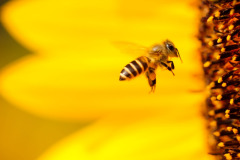Why Are Bees and Wasps So Busy During the Fall?
During the fall season, bees and wasps seem to be everywhere. You are enjoying a cider drink at the local apple orchard, and you are instantly surrounded. You decide to eat dinner outside on your deck and soon hear a buzzing noise. Why are the insects seemingly everywhere?
According to Debbie Delaney, a bee researcher at the University of Delaware, bees and wasps aren't going anywhere. The bees are so busy during the fall because they are preparing for winter. The insects are very important to humans as they help with pollination and the busy fall is just part o their normal functions.
Mrs. Delaney states that bees are not trying to sting you as they flutter around busily in the fall. They are simply getting ready for the colder season. During the end of summer and into the fall, the worker bees will start to work longer hours to collect enough nectar to feed the colony during the winter months. Bees will visit flowers to collect the nectar and pollen to have access to carbohydrates and protein.
When the days begin to shorten, the bees know that they must enter the food-gathering mode. If the winter sees their food supply run low, the colony may not survive. When beekeepers take care of bee colonies, they will add sugary mixtures such as corn syrup to the area to provide additional food sources for the bees.
During the winter, bees will mostly stay in their hives. If there is an unseasonably warm day during the winter, they might venture out to remove waste or clean themselves, even hunting for more food.
As the bees are preparing for the winter in the fall, the wasps are not taking advantage of their rest time. During the end of summer and into the fall, the queen wasp will no longer be laying eggs. During this time, the wasps that gather food can change their approach. The wasps go from working for the colony to feeding themselves. Adults wasps only live a few weeks on carbs before they die during the first hard frost.
It is important for humans to realize the benefits of both wasps and bees. For wasps, the insects will collect insects and help to keep the population of flies and mosquitoes down. With bees, the role is much more critical for human life. If we did not have honeybees in existence, our food sources would be scarce.
Bees work to pollinate crops, from nuts and vegetables to fruits. Without their help, farms would be unable to produce the massive quantities of food that is needed in the United States.


